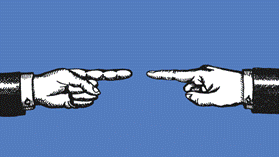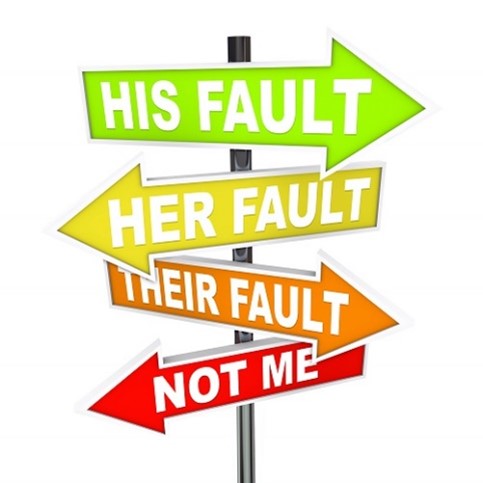Blaming.
It’s a common trap—and more damaging than you think.
Focusing on what your parents did wrong instead of owning up to your own issues.
Chiding your spouse for XYZ while you yourself have been dropping the ball on ABC.
Blaming another department in your organization for product, service, or hiring delays.
Attacking the other side for their faults instead of working together to solve the problem.
It’s tempting to shift blame onto others. Blaming might bring temporary satisfaction, but it ultimately stalls progress and even moves you backwards.
The Problem with Blaming
Blaming, despite feeling oddly good in the moment, comes with many pitfalls. It leaves things unresolved. Often, it backfires, exacerbating problems by damaging relationships.
Also, blaming undermines your own sense of agency and triggers defensiveness in those on the receiving end of your condemnation. (Who doesn’t resent being blamed?) Furthermore, blaming tends to escalate minor issues into larger conflicts. And it can be contagious, perpetuating a cycle of negativity in your family or work team. In the end, it diminishes your effectiveness.
Meanwhile, blaming often involves a degree of deception—distorting facts to evade responsibility while magnifying others’ faults—which erodes your credibility. Ultimately, you bear the brunt of these consequences, not those you blame.
How to Stop Blaming: 10 Tips
The downsides of blaming are clear, but it’s hard to stop because it can feel so darn satisfying. Here are 10 tips for how to stop blaming others:
#1. Stop ruminating on your problems. Fix your attention instead on something more positive and productive.
#2. Shift your attention to what you’re grateful for. You’re much more likely to thrive when practicing gratitude than when you’re casting blame.
#3. Consider why you’re blaming. With a little self-reflection, including focused attention on the situation, you may discover that you’re trying to avoid shame or pain by externalizing the situation, at least in part. Look for a richer and truer picture of the situation than what comes with the simplistic focus on a guilty or offending party. This, of course, requires character and self-awareness.
Are you honest and strong enough to see your own hand in this?
#4. Consider whether you’ve become subconsciously attached to the problem and its associated drama. It may be feeding you with energy—albeit negative and unproductive energy—that makes you feel vindicated or superior.
#5. Practice empathy and try to understand the context, motivations, and feelings of the person you’re blaming. Put yourself in their shoes. Ask questions and explore their perspective and rationale. Which will serve you better: understanding or blaming?
#6. Look for a lesson that you might learn if you focus on understanding instead of blaming. Instead of using it as an opportunity to stroke your ego and attack someone else, why not reframe it as an opportunity for you to learn, grow, and avoid similar problems in the future?
#7. Focus on finding a solution, not a scapegoat. In the end, what you really want is resolution and progress.
#8. Instead of allocating all the blame to somebody else, try assuming joint responsibility. In the end, the assignment of blame matters much less than resolving the issues well. Take note: You want to avoid too much externalization of the problem but also too much internalization of it. In most cases, both sides played a part in letting things slide.
#9. Focus on collaboration instead of blame. Explore ways in which joining forces to address the issues may benefit you both and sidestep potholes.
#10. Take full responsibility for your life, including your choices, behaviors, and outcomes. Sure, there are always outside factors present. But assuming responsibility restores your agency.
How to Make This Happen in Conversation
When in conversation with someone you’re tempted to blame, take a deep breath, regain your composure, and try to remain nonjudgmental, curious, and open-hearted. Focus on jointly exploring the situation and finding solutions instead of attacking each other.
In an article, podcaster and former lawyer Jordan Harbinger recommends avoiding statements like “It’s all your fault” and “I can’t believe you did that.” Instead, ask questions like the following:
“Help me understand why you made that decision.”
“Did I do anything to make you react that way?”
“Is there something I’m missing about my role here?”
“Here’s how I see things. How do you see things?”
“What should each of us have done to make this situation as productive as possible?”
Final Thoughts
Sometimes you may unconsciously resort to blaming. It can be automatic (and thus difficult to stop).
It’s important to recognize blaming as a trap that tends to make things much worse. Why not rise above it and in the process find solutions while building trust?
Tools for You
- Traps Test (Common Traps of Living) to help you identify what’s getting in the way of your happiness and quality of life
- Quality of Life Assessment to help you discover your strongest areas and the areas that need work and then act accordingly
- Strengths Search to help you identify your core strengths and determine how to use them more in your life and work
- Passion Probe to help you identify your top passions and start integrating them more into your life and work
Related Articles
- “The Trap of Blaming Others”
- “The Trap of a Victim Mentality—And What to Do About It”
- “The Power of Taking Full Responsibility for Your Life”
- “The Importance of Trust in Leadership”
Postscript: Inspirations on How to Stop Blaming Others
- “The blame game is a waste of time. Any time you’re busy fixing blame, you’re wasting energy and not fixing the problem.” -Rick Warren, Baptist evangelical Christian pastor and author
- “Blame… can be poisonous, hurtful, or devastating for its victims. It can tear apart marriages and fracture work relationships; it can disable major social programs; it can inflict damage on powerful corporations; it can bring down governments; it can start wars and justify genocides.” -Stephen Fineman, The Blame Business
- “It’s always easy to blame others. You can spend your entire life blaming the world, but your successes or failures are entirely your own responsibility.” -Paolo Coelho, Brazilian novelist
- “Wherever you find a problem, you will usually find the finger-pointing of blame.” -Stephen R. Covey, The 7 Habits of Highly Effective People
- “You become a victim when you blame yourself or others for some problem or error.” -Jay Fiset, Reframe Your Blame, How to Be Personally Accountable
- “Blame is the demonstrated lack of self-respect choosing to deposit one’s negative actions onto others to reinforce one’s view of being of good, fair, and approved.” -Byron R. Pulsifer, author
- “To grow up is to stop putting blame on parents.” -Maya Angelou, poet and civil-rights activist
+++++++++++++++++
Gregg Vanourek is a writer, teacher, and TEDx speaker on personal development and leadership. He is co-author of three books, including LIFE Entrepreneurs: Ordinary People Creating Extraordinary Lives (a manifesto for living with purpose and passion) and Triple Crown Leadership: Building Excellent, Ethical, and Enduring Organizations (a winner of the International Book Awards). Check out his Best Articles or get his monthly newsletter. If you found value in this article, please forward it to a friend. Every little bit helps!









